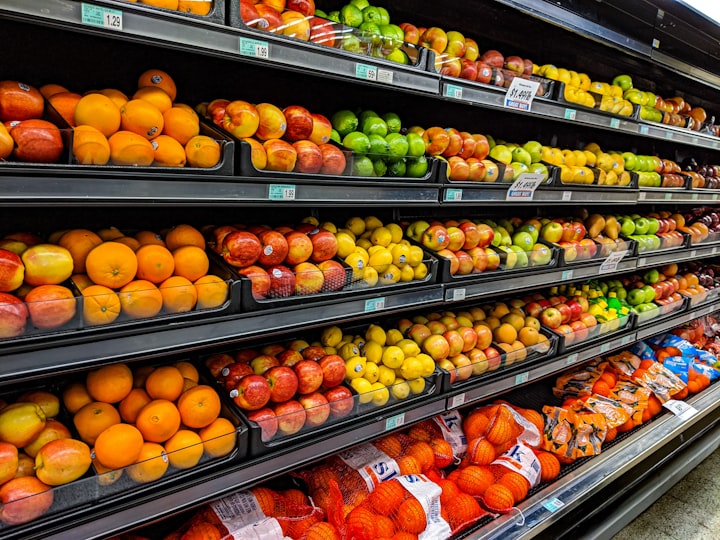12 tips on keeping your food budget down
How to frugally grocery shop
For one reason or other- I've often found that one of the easiest ways to reduce my total monthly expenses is by my variable costs. Grocery shopping and food intake can be so uniquely personal whether it's dietary restrictions- allergies, income related, or level of cooking experience. Below I'll go into 12 ways you can reduce you're total weekly/monthly expenses based off lived experience.
1) Be aware of what foods & ingredients you already have
Go thru your pantry, fridge & freezer to get familiarized with your inventory. Every time you are about to go grocery shopping, being aware of things you may of forgotten about - especially deep in your freezer can help reduce both expenses and food waste (with produce about to go bad- or frozen food that may get freezer burn if they aren't consumed in a timely manner). Build meals & grocery lists based off what you already own.
2) Keep a notepad or journal on hand for cravings
Craving burgers? Craving wings? Craving fruits or sweets? Mark down what your body is needing or craving to both keep take out temptations at bay, but also have a blueprint of meals & snacks you'd like to consume.
3) Review the 2 points above while looking thru flyers
If you see items on sale that you were already craving or ingredients to create meals- then you're golden! It actually happens quite frequently- and it helps you decide which local grocery store to hit up if you have multiple to choose from. Once you've looked thru and seen the items you need/want- have another look with an open mind and see what else is on sale. If anything is appealing- look up recipes and try to create a meal based off items on sale. It's a great way to be creative with your food- and potentially try things you've never had before!
4) Become aware of your "staple" items - keep an eye on when they go on sale and stock up
Especially non-perishables like sugar, rice, beans, pasta, popcorn kernels, etc. Having one or two back up containers will go further in the long run. This is a useful trick pre-quarantine days. Now that the world has changed- do try to be mindful of not stocking up a whole cart, and any restrictions/limits of your grocery store. But having back ups can save 10s if not 100s of dollars in the long run if you purchase your personal staples when they are discounted.
5) You're at the grocery store! Now what?! These are some things to look out for
Discounted/near expiry items. In the produce and bakery section there is often a bin-a shelf- an area that staff place near expired goods. Often put out first thing in the morning, or close to closing. Finding ripe bananas is a great score- they can be used for baking. Yum! Banana bread ! Or used for smoothies, making banana ice cream ( a great vegan alternative to ice cream- placing a banana or two in the freezer then smashing it in a bowl- adding topics. Great healthy dessert!) Items in the bakery - like bread, buns or sweets can often be frozen and taken down as needed. Sometimes they even have pre-made salads- that needs to be eaten the same day but provides a quick, nutritious and tasty meal.
6) Looking out for things part 2:Produce & Bakery
You've moved on from the produce & bakery and have entered the dairy section. Looking at discounted/near expiry milk products isn't as versatile and will need to be used up more quickly. But getting milk or cream that is greatly reduced and expire in a day or 2 is great if you are either a multi-person family that goes thru milk quickly or want to bake or cook something that needs dairy. I often use cream to make my own alfredo sauce (with parmesan), and use milk to make casseroles, mac and cheese or use it to bake a variety of sweets-and freeze the excess. Yogurts is great as well, usually they are discounted a week or so before expiry- making it do-able for me to consume it.
7) Looking out for things part 3: Meat
Ok- so you've gone thru the produce, the bakery AND dairy section. There can't possibly be anywhere else to save...oh wait! The meat section- Often times there will be meats with best before dates day of reduced. Purchasing them- and freezing them for later use is a great way to cut down on food expenses.
8) Reduced price meat is great- but reducing meat intake is even better
Consider reducing meat consumption- very frequently it's the most expensive part of a grocery bill. Swapping out chicken for chickpeas or lentils in Indian based dishes - is still very much delicious! Butter Chickpea! You don't need to become a vegetarian but changing your eating patterns from eating meat at every meal/daily to eating it 2-3 times a week will lower your grocery bill significantly.
9) Batch cook + Buy in bulk
When buying meat for example- you'll get a better price per lb/kg if you buy a family pack of chicken breast for example then buying them individually. I often see family packs go for about $25-$30 a pack. In my area, they go on sale about every 2-3 months for $8-$15 a pack- where buying multiples will extend your budget in the long run. When you see they are on sale- I suggest dedicating a higher amount towards your groceries (on the higher end - $50/week) and offset it the following weeks with a cheaper haul. Making a large batch of meals and freezing it will reduce day to day costs & will make it easier to meal plan when you already have pre-made inventory.
10) Go grocery shopping more frequently!
Often times as consumers- we just accept that prices we pay at a grocery store is fair market value. Unlike larger purchases like a car, electronics, etc. We don't often question or research what is a fair price for individual items we buy on a smaller level. But over the course of a long period of time if you are purchasing flour for $12 at one store, but discover it's $7 elsewhere (regular price)- that $5 difference may not significant in the moment but overtime can add up quickly especially for staple items. There's studies out there that indicate perceived cheaper places like Walmart or Superstore only carries about 1/3 of significantly cheaper items. 1/3 items only marginally cheaper - 1-10cents cheaper, and the other 1/3 actually more expensive than market or local value. If you start looking at the prices of your favorite items (regular price) at multiple stores- you may discover it's cheaper elsewhere!
11) Coupons! Reward Programs! Cash-backs!
There's countless sites tailored to your interests/local area/brands near you that you can subscribe to both for email or mailed coupons. Frequently it's buy one get one free- but sometimes you can receive a % off, or a dollar value deducted off. Sometimes if can even find items on sale for the value of the discount! Making it essentially free- just needing to pay applicable taxes. Some grocery stores offer point systems that are redeemable for future grocery purchases. Such as PC points for Superstore or Shoppers Drug Mart (for Canadian residents). If you have a credit card that has a cash back feature- many of them have a higher percentage for grocery/food/gas purchases. If it's money you are already spending- using it as a form of payment may not save you money- but you'll get a bit of a kickback for spending money on essential items anyways.
12) Learning basic/easy recipes
When looking at your grocery bill- besides meat one area that can get quite expensive is pre-made/preserved items. Such as pasta sauces, gravies, etc. Looking online on to make simple sauce can further stretch your money. Another great resource is this free e-book that has a great selection of frugal minded recipes: https://cookbooks.leannebrown.com/good-and-cheap.pdf.






Comments
There are no comments for this story
Be the first to respond and start the conversation.